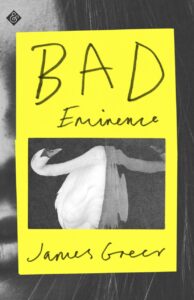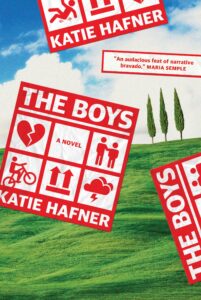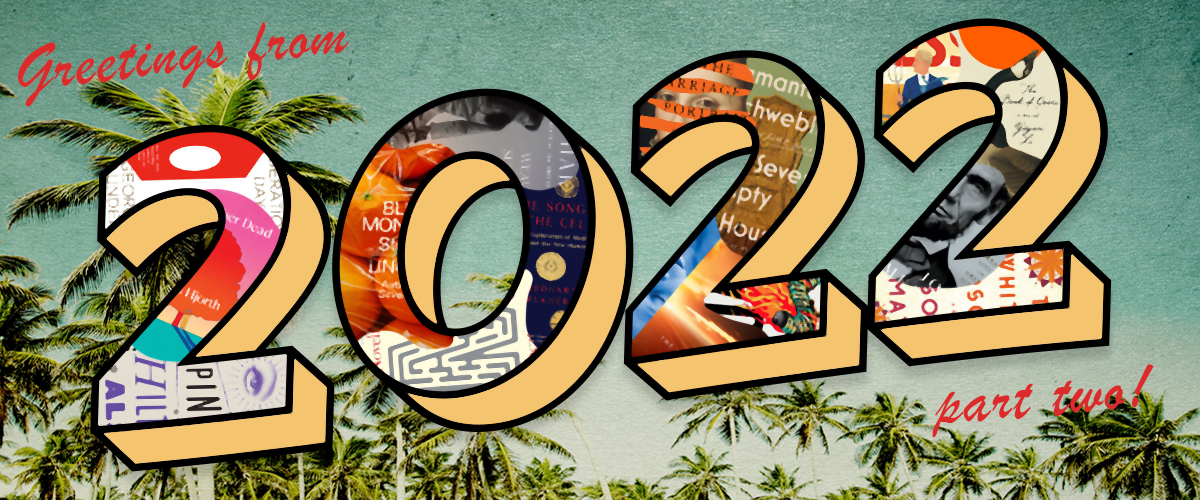
Lit Hub’s Most Anticipated Books of 2022, Part Two
230 Books to Read Before 2023
Halfway through, and 2022 is looking like another bad year. (That is, if you care about reproductive health and bodily autonomy, the environment, global peace, affordable living, sane public health policies, not being gunned down in a school, supermarket, or literally anywhere, and/or the future of democracy itself.)
But you’re not here to think about any of that. You’re here because you’ve already read all the best new books from the first half of the year and you’re ready for more. (Right? Right.) For our second Big Preview of the year, we’ve picked out the 230 books being published between July and December that we’re most looking forward to. No matter what kind of a reader you are, or what kind of a year we’re having, you’re sure to find something to interest you here.
JULY
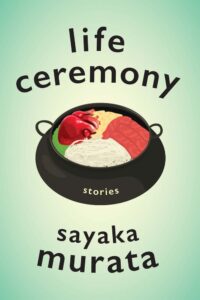
Sayaka Murata, tr. Ginny Tapley Takemori, Life Ceremony
Grove, July 5
Sayaka Murata’s first short story collection translated into English (by Ginny Tapley Takemori), Life Ceremony is just as weird as her novels. With characters that inhabit the same uncanny valley as Keiko, the “Smile Mart” employee from Convenience Store Woman who has found her life’s purpose in the orderly comings and goings of the store, or Earthlings’ preteen Natsuki, who understands her stuffed hedgehog is from another planet and deadpans through incredible violence, the characters here are loners, up against conventions and expectations that cast them as outside traditional. Murata makes us question our understanding of what makes us human (or, in the case of “Lovers on the Breeze,” a window curtain). –Emily Firetog, deputy editor
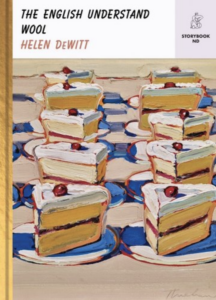
Helen DeWitt, The English Understand Wool
New Directions, July 5
Helen DeWitt’s The Last Samurai was a stroke of genius. I have thought about that novel a lot this year, and I don’t think I will ever understand how she managed such a masterful control over the narrative. After that, I will read anything Helen DeWitt puts her name on, so I’m particularly stoked for the release of her latest, The English Understand Wool. (What a great name!) This novella will follow a 17-year-old whose parents have very specific rules, mostly concerned with “good taste.” But that might all go right out the window during annual Ramadan travels, when finds herself alone in New York. Still not quite sure what this is going to be about? Same. A visit to the New Directions website tells me nothing else, but I did stumble upon Helen DeWitt’s official bio, the last line of which reads: “She has been based in Berlin since 2004, but also spends time at a cottage in the woods of Vermont improving her chainsaw skills.” Her chainsaw skills! I realize she means that literally, but it also applies to her work on the page. Helen DeWitt has this magical ability to cleanly cut open a story and the hearts of her readers along with it. –Katie Yee, associate editor
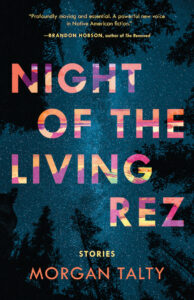
Morgan Talty, Night of the Living Rez
Tin House, July 5
Morgan Talty’s debut collection of linked stories, all narrated by a character named David, highlights the contemporary tales of Talty’s tribe, the Penobscot. These characters and their world shimmer with the precise details Talty so expertly showcases—the specific childhood cruelty, the expression of scarred grief. This is a stunning debut, both dark and tender, and reminder of the necessity and rewards of a diverse range of Native voices in the publishing industry. –Jessie Gaynor, senior editor
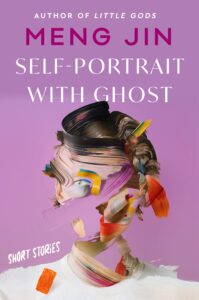
Meng Jin, Self-Portrait with Ghost
Mariner, July 5
In her debut novel, Little Gods, Meng Jin took us from China to America and back, and our protagonist was preoccupied with cobbling together an understanding of her family. In her forthcoming collection, Self-Portrait with Ghost, that close observation is turned inwards (as the title might suggest). The narrators in these pages are painfully honest. Look: “With previous lovers, I’d eaten up stories of other women hungrily, hurting myself with jealousy until it felt like love.” Ouch. Hurt me here!
Layered in these tales is the way the past continues to haunt—both in ways we accept (exes) and in ways that verge on the surreal (ghosts). The eponymous story takes place outside the public library, where the narrator’s dead aunt is waiting for her so she can criticize her writing. Yes, it’s safe to say these stories pack just as much of an emotional wallop as her first book. –KY
James Greer, Bad Eminence
And Other Stories, July 5
This sounds extremely fun: a narcissistic translator whose twin sister is a movie star is offered a job translating “an Extremely Famous French Writer who is not in any way based on Michel Houellebecq,” but when she takes it, the unravelling begins. The publisher calls it “at once an old-school literary satire in the mode of Vladimir Nabokov as well as a jolly thumb in the eyes of contemporary screen-life and digital celebrity,” which is about as delicious as it gets for me. –Emily Temple, managing editor
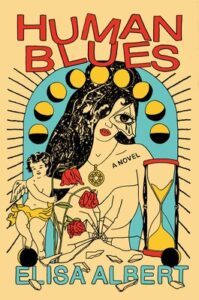
Elisa Albert, Human Blues
Avid Reader Press, July 5
Feminism has failed us. What women were promised has not come to pass: there seems no real, tangible route to “having it all.” I haven’t seen enough written about what happens when you want both a family and a life of your own, but Human Blues is a good start. The story centers on Aviva Rosner, a singer-songwriter who craves a baby in addition to her lauded musical career, and who pours her angst and longing into her fourth album. Told in chapters of Rosner’s menstrual cycles, the novel does a thrilling job of writing through womanhood, the complexities of femininity, and what it means to get what you want, or what you thought you wanted. –Julia Hass, contributing editor
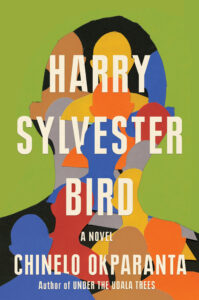
Chinelo Okparanta, Harry Sylvester Bird
Mariner Books, July 12
Okparanta’s satirical novel follows a decade in the life of Harry Sylvester Bird, a young white man who is convinced he’s Black. Harry’s parents are racist, bordering on cartoonishly evil, and the world is an alternative-current reality, including COVID protocols like vaccination checkpoints. After graduating high school, Harry, now G-Dawg, fully embraces his Black identity and leaves his small, backwards town, moving to New York. He problematically attends college on a white-supremacist scholarship and then falls in love with Maryam, a student from Nigeria. Okparanta weaves a narrative that’s uncomfortable for its truths—the limits of allyship, the way in which white supremacy is ingrained in every gesture. It’s an ambitious book that shines a light on all the worst parts of our current cultural moment, a sort of masochistic romp around racism. –EF
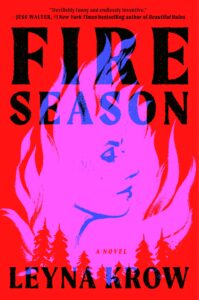
Leyna Krow, Fire Season
Viking, July 12
Fire Season is a smoldering visitation of the American West, a novel about three opportunistic figures who converge following the great fire of 1889 in Spokane Falls: a conman, a bank manager, and a woman who can see the figure. Sparks fly as they collide with one another, and it’s not long before their simmering tensions, attractions, and conflicts lead to a conflagration most might not see coming, and from the ashes of which most will never rise up again. –Olivia Rutigliano, CrimeReads associate editor
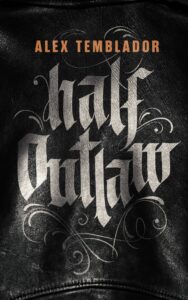
Alex Temblador, Half Outlaw
Blackstone Publishing, July 12
If you were a fan of Sons of Anarchy but really wished there had been a biracial female narrator putting her own spin on toxic masculinity and bigotry, then Half Outlaw is the book for you. And me. I really enjoyed this book. Alex Temblador’s orphaned protagonist was raised by her outlaw biker uncle and his crew, but takes after her Mexican father and never felt fully accepted by the casually racist motorcycle club (the author wrote Half Outlaw partly to explore her own biracial identity). After her uncle dies, she’s called back to the club for one final Grieving Ride, and must reexamine her complicated relationships with the men who raised her, imperfectly but with love. –Molly Odintz, CrimeReads senior editor
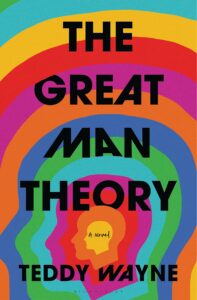
Teddy Wayne, The Great Man Theory
Bloomsbury, July 12
Reading Teddy Wayne’s latest novel—about a 40-something father, adjunct, and writer of cultural commentary no one much wants to read—is, at times, painful. As a character, Paul evokes pity, irritation, and, at times, grudging identification. For all the discomfort, though, I loved The Great Man Theory, both because of Wayne’s knack for dark humor and because its plot clicks so satisfyingly into place. As Paul—a self proclaimed Luddite with a newly-acquired habit of writing lengthy internet comments on a liberal news site and obsessively checking their likes (while teetering on the edge of the Intellectual Dark Web)—falls deeper into the despair of political impotence and the punishing gig economy, he devises a plan to cement his legacy, make his daughter proud, and save America (maybe). –JG
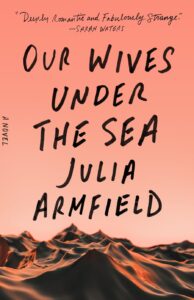
Julia Armfield, Our Wives Under the Sea
Flatiron, July 12
Leah is a marine biologist who is used to undersea expeditions, but when she and her colleagues embark on what should be a routine field excursion, their vessel sinks and they are stuck at the bottom of the ocean for months. When Leah finally gets free and returns home to her worried and loving wife, Miri, she is changed. The woman Miri once loved is now comprised of silence, darkness, and weight, refusing to reveal what happened under the water, turning inward and away from Miri. Our Wives Under the Sea meditates on whether it is possible to share the full truth of our hearts with others, what it means to leave, and most of all, what it means to stay. –JH
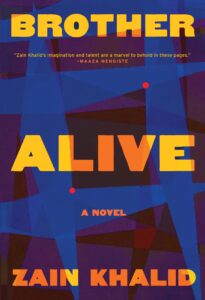
Zain Khalid, Brother Alive
Grove Press, July 12
How does one even begin to describe the intricate web Zain Khalid has woven in his wondrous debut? This story takes us from New York City to Saudi Arabia and touches on themes of family, queer desire, capitalism, identity, and the unimaginable things we might do for survival. On the surface level, Brother Alive is a family epic about three adopted brothers living above a mosque in Staten Island: Dayo, Iseul, and Youssef (our guide for much of this journey). Their guardian, Imam Salim, pushes them to excel, but the secrets of his past force him to keep them at a distance.
There is one other very important figure worth mentioning: the eponymous Brother, sort of an imaginary friend that accompanies our narrator throughout his life. (Of Brother, he says, “When we acquire language, we are each other’s first word.”) He takes the shape of various creatures, and he feeds off memories and literature. (At some point, Italo Calvino’s If on a winter’s night a traveler is referred to as “a book of beginnings, the way a child’s life might feel.” A love of language is a gift throughout this novel; Zain Khalid crafts each line with care and a masterful sense of command.) Even in the first section of the novel, in the glow of the main characters’ younger days, Brother’s presence casts a shadow over everything. What exactly is Brother, you might be wondering. You’ll have to read to find out; the truth is more wild than you could possibly imagine. But what I will say is that, unbeknownst to Youssef at the time, Brother ties him to Imam Salim’s sordid past and the story of what happened to his birth parents.
Although this novel spans generations and continents, what is perhaps most striking is the intense intimacy that is present, too. The bond between the three boys is rendered so realistically here; their teasing, their warmth, and their obligation to one another leap off the page. The majority of the novel is also framed as a story being told to Youssef’s niece (and the second section, a break in the narrative, is a letter to the boys from Imam Salim). There is an incredible generosity and tenderness in the telling. –KY
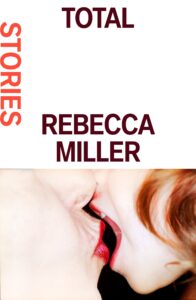
Rebecca Miller, Total
FSG, July 12
The first collection of short fiction from acclaimed indie film director Rebecca Miller (The Ballad of Jack and Rose, The Private Lives of Pippa Lee) in over 20 years, the seven brilliantly knotty and piercingly intimate stories in Total depict characters undone, temporarily or irreparably, by obsessive love. In “Mrs. Covet,” an overwhelmed mother of three becomes unnerved by the uber-competent housekeeper’s bond with her infant son. In “Vapors,” the appearance of an emotionally abusive former lover sends a woman on a reverie through her past relationships. For me, the collection’s standout is the title story, which begins with a sci-fi premise (advanced pleasure cell phones that cause heartbreaking birth defects) and becomes a sweetly tragic tale of misguided familial love and lost innocence. –Dan Sheehan, Book Marks editor in chief
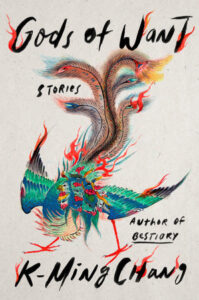
K-Ming Chang, Gods of Want
One World, July 12
When I read K-Ming Chang’s debut novel, Bestiary, I was floored. She has this memorable way of marrying myth with a story about migration, mothers and daughters, queerness, and long-buried family secrets. Her new story collection, Gods of Want, lives in a similar realm and reaffirms her place as one of our most enchanting storytellers today. In these pages, you’ll find ghost cousins, a lot of aunts, haunting mother-in-laws—essentially, women who are trying to make it work. From every first sentence, she has you hooked. In “Auntland,” the first story, we begin: “I had an aunt who went to the dentist and asked to have her tongue pulled.” Her tongue!
So much of the joy of reading K-Ming Chang’s stories is in her ability to constantly surprise. In “Xífù,” she starts with: “I don’t mean I want her to die. I’m just saying, what kind of woman pretends to kill herself six times?” Every sentence bites down. There’s a wry matter-of-factness that makes you buy into all the surreal elements. There’s a dark humor that makes you lean in closer. –KY
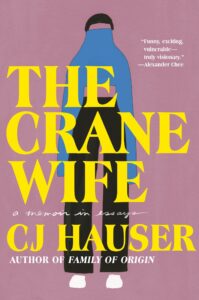
CJ Hauser, The Crane Wife: A Memoir in Essays
Doubleday, July 12
CJ Hauser’s Paris Review piece “The Crane Wife”—a beautiful essay about ending an engagement and a whooping crane—was a viral sensation when it was published in 2019. Using that essay as an anchor, Hauser’s new collection explores more stories of love, romantic and familial. There’s an essay about scattering her grandmother’s ashes in Martha’s Vineyard, where John Belushi is also buried—and the space between those two people. There’s a close reading of the movie The Philadelphia Story. There’s a meditation on what it means for a woman to live alone. While it’s always difficult to summarize an essay collection, what holds The Crane Wife together is Hauser’s unpacking of emotional truths: who do we love, and why, and what happens when they’re gone? When we’re alone? When we forget what it was like to love them? –EF
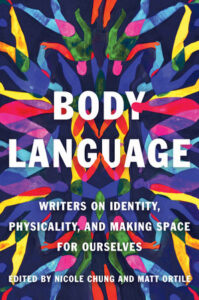
Nicole Chung and Matt Ortile, eds., Body Language: Writers on Identity, Physicality, and Making Space for Ourselves
Catapult, July 12
It’s no secret that I love a good essay anthology. Multiple minds and writing sensibilities circling around the same topic is one of my favorite reading experiences, and the topic of the body makes for particularly compelling fodder—as Melissa Febos wrote in response to the collection, “There is nothing more ordinary than living in a body, but so much about it can remain unspoken.” Body Language gathers 30 essays from Catapult’s archive that venture into that unspoken territory—with essays about weight, disability, athleticism, fertility, race, disordered eating, gender, and more—featuring writers you know and love and others you’ll be glad to encounter. –Eliza Smith, special projects editor
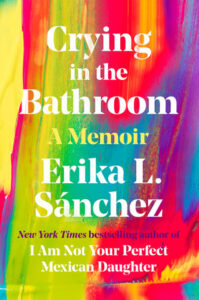
Erika L. Sánchez, Crying in the Bathroom
Viking, July 12
Honestly, how could you not want to read a book with this title? Crying in the Bathroom *might* have you doing just that—but only if it’s one of those laughing-so-hard situations. To make your readers crack up while also discussing weighty topics like sexism, racism, and depression is no easy task, but it’s one Erika L. Sánchez is well equipped for. A National Book Award finalist for her YA novel, I Am Not Your Perfect Mexican Daughter, she has written a memoir/essay collection that promises to be just as poignant and bold. –KY
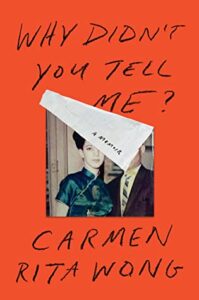
Carmen Rita Wong, Why Didn’t You Tell Me?
Crown, July 12
Perhaps you know Carmen Rita Wong from her stint as an advice columnist or a television host. She has been a chair on the board of Planned Parenthood and currently sits as a chair for The Moth. I think it’s safe to say that she’s built an incredibly successful career for herself—plus, she specializes in personal finance—which means she’s probably the kind of person who people love to ask: What’s your secret? Well, her memoir does hinge on a secret: one her mother kept from her for most of her life. No, I’m not going to tell you what it is! Yes, you should absolutely read it to find out for yourself.
For 216 pages, you will be invited into Carmen Rita Wong’s vivid childhood memories; you will intimately come to know some of the members of her family. In this memoir, our country’s race relations and obsession with identity play out in the unraveling of one family’s story. Why Didn’t You Tell Me? is a propulsive pursuit of the truth and the way it’s shaped this writer’s life. –KY
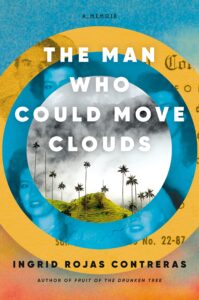
Ingrid Rojas Contreras, The Man Who Could Move Clouds
Doubleday, July 12
This one sounds absolutely fascinating. Colombian novelist Ingrid Rojas Contreras, author of 2019’s Fruit of the Drunken Tree, has written a family memoir unlike any other. Rojas Contreras was raised amid the political violence of 1980s and 90s Bogotá, but it was while living in the US in 2012 that she suffered a serious head injury, one which caused an eight-week bout of amnesia. Decades previous, her mother, after a similar injury, gained the ability to see ghosts and hear voices—a gift she inherited from her legendary healer father, Nono. The Man Who Could Move Clouds is the story of the return trip Rojas Contreras and her mother made to Colombia to disinter Nono’s remains and tell his incredible story, as well as the stories of her ancestors and her country. –DS
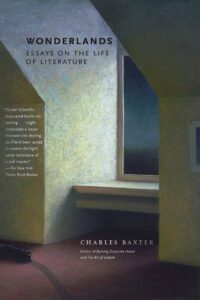
Charles Baxter, Wonderlands: Essays on the Life of Literature
Graywolf, July 12
I love Charles Baxter’s empathic, stealthily funny fiction deeply (one of the readings at my wedding was from The Feast of Love), so I have no doubt that his collection of craft essays will be both illuminating and beautiful. The essays in the book range from explorations of the titular literary wonderlands to examinations of the “request moment” (or: “There’s something I want you to do”) in stories. A revelatory craft book is a rare and wonderful gift for a writer-slash-reader, and I look forward to devouring this one. –JG
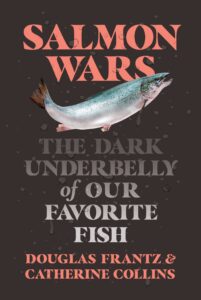
Catherine Collins & Douglas Frantz, Salmon Wars: The Dark Underbelly of Our Favorite Fish
Henry Holt & Company, July 12
I enjoy a nice salmon fillet from time to time and have, in my ignorance, always associated the fish with good health and environmental sustainability, so I’m a little terrified to read this damning expose of the international salmon farming industry. Pulitzer Prize-winning journalist Frantz and former private investigator Collins team up to expose the destructive impact of Big Salmon (which the authors compare to Big Tobacco and Big Agribusiness in its insidiousness) on both the natural world and on public health. Collins and Frantz take us from the massive parasite- and chemical-plagued ocean feedlots to the grotesque industrial hatcheries that threaten fragile coastal ecosystems, interviewing a slew of colorful and shady characters along the way. –DS

Elvia Wilk, Death by Landscape
Soft Skull, July 19
Elvia Wilk is a wonderful (and strange) mind to spend time with, and Death by Landscape, an essay collection billed as “fan nonfiction,” gives readers ample room to do just that. As Snigdha Koirala wrote for Lit Hub earlier this year:
Erotics of compost, vampires, medieval nuns, and solarpunk. Wilk’s “fan nonfiction,” examines the works of Anne Carson, Octavia Butler, Michelle Tea, and more to probe the lines and shapes of “weird fiction” in the face of extinction and all its urgency and anxieties. At the heart of it are questions of how to tell stories that center the Earth as opposed to humans, that help us grapple with the end of the world, and that help us see and be with the dark of it all.
This is what a beach read really looks like. –Jonny Diamond, Lit Hub editor-in-chief
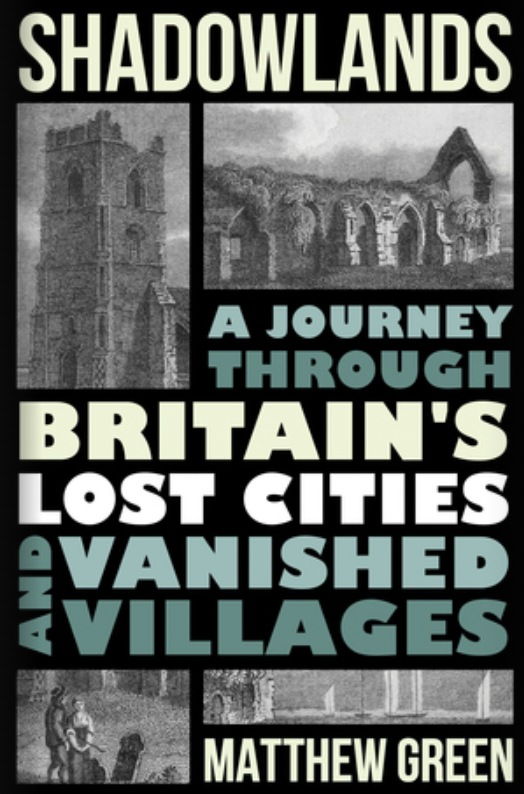
Matthew Green, Shadowlands
W.W. Norton, July 19
If you told me that British historian Matthew Green was some kind of delightful English Calvino who’d conjured up an odd fictional encyclopedia of disappeared cities, lost towns, and ghostly villages, I’d still want to read this book. But no, these stories of ancient English towns falling off sea cliffs, ghostly hamlets done in by pestilence, and eerie villages buried by time and earth, are all true. As so much of our collective imagination fixates on the fragility of our near-future existence, it is worth spending a little time with history’s stark examples of time’s dominion over us all. –JD
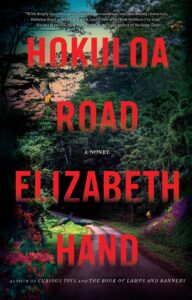
Elizabeth Hand, Hokuloa Road
Mulholland, July 19
If Lost had been written by Jane and Paul Bowles, with some input from Stephen King, then it might read something like Hokolua Road. I guess I just could have called it a tropical version of The Shining, given the set-up: an out-of-work builder from Maine accepts a job as a live-in caretaker for a remote Hawaiian estate owned by reclusive and eccentric tech billionaire. He’s out of his element, far from help, and mysterious things just keep happening… But is it all in his admittedly messed-up head, or is the land itself rejecting him? –MO
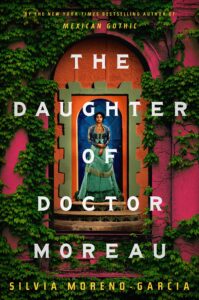
Silvia Moreno-Garcia, The Daughter of Doctor Moreau
Del Rey, July 19
If there are two things I love in this world, it’s contemporary reimaginings of Victorian era horror and sci-fi, and joyful genre mashups in literature. Thank the Lord, then, for Silvia Moreno-Garcia, the author of the 1970s Mexico City noir Velvet Was the Night and the postcolonial gothic romance Mexican Gothic, who brings her chameleonic powers to bear on H.G. Wells’ 1896 “exercise in youthful blasphemy.”
A thrilling fable of imperialism and exploitation, The Daughter of Doctor Moreau is the story of Carlota Moreau, a young 19th-century woman living on a ranch in northern Yucatán with her beloved mad scientist father and his “hybrids”—part human, part animal, bred to eventually work the haciendas of Dr. Moreau’s wealthy, and increasingly impatient, patron, Hernando Lizalde. Father, daughter, alcoholic caretaker Montgomery, and hybrids live together in (relative) harmony until the arrival of the patron’s spoiled son, Eduardo, who falls in love with Carlota.
As she explores her attraction to Eduardo and strains against the gilded cage her father has built for her, Carlota also begins to question the morality of the not-so-good doctor’s experiments. This sublime hybrid of historical, speculative, and gothic fiction might be Moreno-Garcia’s best yet. –DS
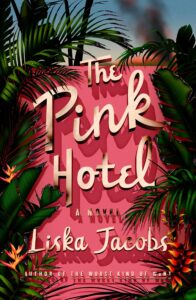
Liska Jacobs, The Pink Hotel
MCD, July 19
This is the perfect book to recommend to all your friends in hospitality!!! And also just the perfect book. I tore through this one like a California wildfire—an appropriate comparison, given the novel’s setting in a high-end hotel beset by fires all around. As the hotel descends into a Roman-style bacchanalia, protestors fill the streets, smoke fills the skies, and those who live and work in the hotel must make their choice between grotesque hedonism and leaving in disgust. –MO
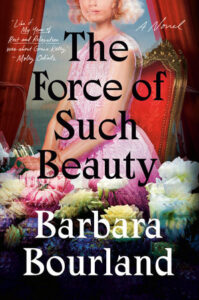
Barbara Bourland, The Force of Such Beauty
Dutton, July 19
I’d describe this one as My Year of Rest and Relaxation if it was written from the perspective of Grace Kelly or Lady Di. A former Olympic athlete, body broken from overtraining, meets the handsome heir to a small kingdom and becomes his blushing bride. Soon, her nuptial bliss turns to waking nightmare, as her husband and her mother-in-law conspire to control every dollar in the kingdom and every moment of the new princess’s life. –MO
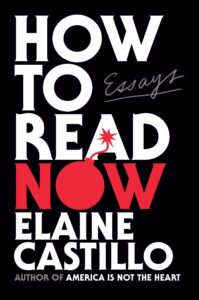
Elaine Castillo, How to Read Now: Essays
Viking, July 26
Every few months, the literary world seems to implode over the question of whether reading makes us better people. Does it? Should it? Is that the function of art? Elaine Castillo, author of the bestselling debut novel America Is Not the Heart, has a few thoughts, on that question and a dozen others. If I must boil down her argument to the space of a blurb, it’s that “white supremacy makes for terrible readers”—a lesson that’s playing out on the national news every day, and which makes me hopeful that this will be a Very Talked About Book. Observing the classics to the contemporary (including other “readable” media beyond books), and thinking deeply about the roles of reading in our world, Castillo urges us toward “a more daring solidarity.” –ES
Katie Hafner, The Boys
Spiegel & Grau, July 26
This is a pandemic novel about love, isolation, and family—then it takes what we in the business like to call “a turn,” after which it is still a pandemic novel about love, isolation, and family, except it is a much, much weirder one. I will say no more, for now. –ET
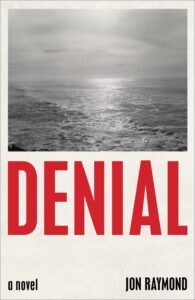
Jon Raymond, Denial
Simon and Schuster, July 26
Imagine a world where a global protest movement brought all the oil executives and lobbyists to a Nuremberg-like trail, convicting them and ridding the world of our fossil fuel dependency. Though the results of devastating climate change still exist (cyclones, megafires, Venice under water) the criminals are behind bars. Or, in Jon Raymond’s cinematic-thriller, most of them are.
One of them, Robert Cave, is hiding out in Mexico, and journalist Jack Henry is going to find him. But an unexpected friendship makes Jack question individual morality and punishment, and the nature of justice itself. There are a wealth of recent novels imagining the climate disaster that will befall us and the destruction of social contracts. But Raymond’s version of climate change—the victory of the guilty facing repercussions and the possible healing of the planet—reinforces the fact that the most important crisis facing humanity is human nature itself. –EF

Dwyer Murphy, An Honest Living
Viking, July 26
I don’t like reading books on the computer, or any sort of screen really, but I made my first exception so that I might read An Honest Living as soon as possible. Not only is it written by the great Dwyer Murphy, in whose esteemed company I have been gratified to work for several years (there’s your disclaimer), but it is also about all my favorite things: rare booksellers, old books, private investigators, post-millennium Brooklyn, the cafe in Sotheby’s auction house (which used to be on the top floor but now is in the basement), the New York Antiquarian book fair, brazen impostors, Roberto Bolaño… the list goes on. Anyway, I had a feeling I would enjoy it.
But, even after delightedly reading Dwyer’s slick, mile-a-minute prose on our site for three years, I wasn’t prepared for just how fun his debut novel would be. This is a novel—a smooth, timeless, thoughtful, wistful novel—that has to be read to be believed. It is a controlled, collected mystery, with narration that falls in step with the classic noir PI voice without turning it into a joke or sounding cliche. The best part about it is that it is a love letter to New York City—to the small New York, the nooks and crannies of it, the secret, out-of-the way landmarks and the vibrant hole-in-the-wall spots hiding in plain sight. And it is about the characters who live there—we meet so many charming, whimsical-yet-real-seeming characters that I felt at times like I was rereading The Pickwick Papers. It is a novel about exploring New York while investigating within it, getting to know it—but also holding on to it.
Our protagonist notes that countless small shops have come and gone but lovingly lingers in those that have remained somehow, and tries (as Dwyer does with the whole endeavor) to keep them alive. The central mystery is great, but its overall sensibilities are so tremendous that I would have enjoyed it just as much if it were a meandering travelog where nothing even remotely mysterious happened. –OR









